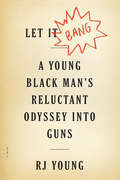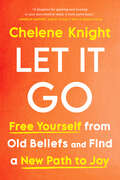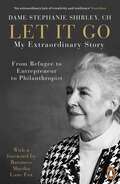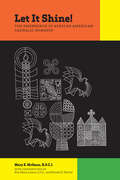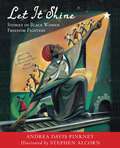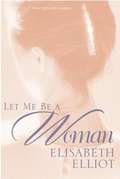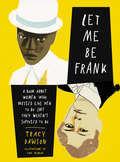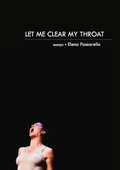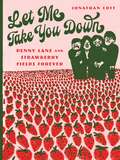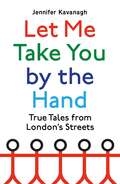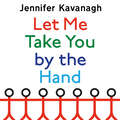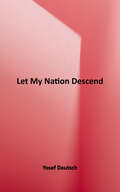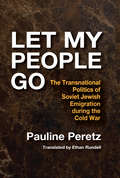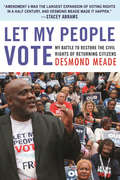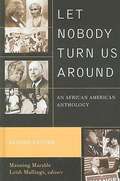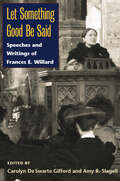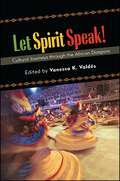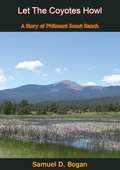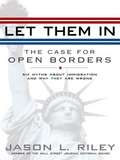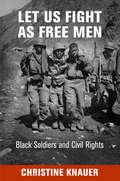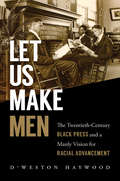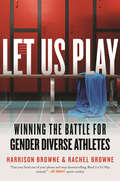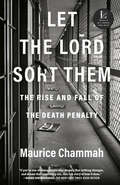- Table View
- List View
Let It Bang: A Young Black Man's Reluctant Odyssey into Guns
by RJ YoungA young black man&’s funny and searing quest to learn to shoot, and a fascinating odyssey into race, guns, and self-protection in America. The most RJ Young knew about guns was that they could get him killed. Until, recently married to a white woman and in desperate need of a way to relate to his gun-loving father-in-law, Young does the unimaginable: he accepts Charles&’s gift of a Glock. Despite, or because of, the racial rage and fear he experiences among white gun owners (&“Ain&’t you supposed to be shooting a basketball?&”), Young determines to get good, really good, with a gun. Let It Bang is the compelling story of the author&’s unexpected obsession—he eventually becomes an NRA-certified pistol instructor—and of his deep dive into the heart of America&’s gun culture: what he sees as the domino effect of white fear, white violence, black fear, rinse, repeat. Young&’s original reporting on shadow industries like US Law Shield, which insures and defends people who report having shot someone in self-defense, and on the newly formed National African American Gun Association, gives powerful insight into the dynamic. Through indelible profiles, Young brings us up to the current rocketing rise in gun ownership among black Americans, most notably women.Let It Bang is an original look at American gun culture from the inside and the other side—and, most movingly, the story of a young black man&’s hard-won nonviolent path to self-protection. &“We need more books like this: personal, emotional meditations on gun ownership…showing us all the ways in which guns take on meaning for people, and what happens when those meanings collide.&”—Pacific Standard
Let It Go: Free Yourself from Old Beliefs and Find a New Path to Joy
by Chelene KnightFor readers of Ross Gay and listeners of Therapy for Black Girls, a reflective examination of Black self-love and joy that guides the reader to ditch old beliefs, achieve difficult unlearnings and redefine language, relationships and love to find their own unique path to joy. A warm, candid and essential book that will guide the reader to carve a new path to joy as unique as each individual. Created by the founder of Breathing Space Creative Literary Studio, acclaimed writer and editor Chelene Knight, Let It Go draws on personal experience and the advice of leaders from various Black communities to share hard-won tools for joy-discovery—tools such as how to say no with love; how to call back activities that feel good; how to reshape communication with those closest to you; how to revise language; and most of all, how to learn to let go in order to redefine what we think joy is.Organized around the seasons and the natural cycle of reflection and renewal, Let It Go showcases, through conversation and solitary reflection, the broad spectrum of Black realities and reveals the colourful kaleidoscope of joy and your own ways to find it. From Let It Go:“My own path to joy has been blurred by hardship, but part of my journey is that I refuse to believe that all of my negative experiences are tethered to being a Black woman, even though it can feel like this, even when some people want me to feel like this. And when I feel it, it’s a pain that swells and refuses to subside. I didn’t learn this on my own and I don’t think I can unlearn it on my own. But I’m willing to do the work. I want my joy as I find it; I want my joy as it comes. I’m willing to let the wind push me backwards through the difficult moments. Maybe there’s something big holding you back too. Take a breath. What is it? Maybe we can let go, together.”
Let It Go: My Extraordinary Story - From Refugee to Entrepreneur to Philanthropist
by Richard Askwith Dame Stephanie Shirley CHA moving memoir from a woman who made a fortune in a man's world and then gave it all away...soon to be turned into a filmIn 1962, Stephanie 'Steve' Shirley created a software company when the concept of software barely existed. Freelance Programmers employed women to work on complex projects such as Concorde's black box recorder from the comfort of their own home. Shirley empowered a generation of women in technology, giving them unheard of freedom to choose their own hours and manage their own workloads. The business thrived and Shirley gradually transferred ownership to her staff, creating 70 millionaires in the process.Let It Go explores Shirley's trail blazing career as an entrepreneur but it also charts her incredible personal story - her dramatic arrival in England as an unaccompanied Kindertransport refugee during World War Two and the tragic loss of her only child who suffered severely from Autism.Today, Dame Stephanie Shirley is one of Britain's leading philanthropists, devoting most of her time, energy and wealth to charities that are close to her heart. In Let It Go, Shirley tells her inspirational story and explains why giving her wealth away - letting it go - has brought her infinitely more happiness and fulfilment than acquiring it in the first place.Co-written with Richard Askwith, the former Executive Editor of The Independent and the award-winning author of seven books in his own name, including biographies of Emil Zátopek and Lata Brandisová.'An extraordinary tale of creativity and resilience' - Guardian'This engrossing story of an extraordinary life is filled with lessons in what it means to be human' - Financial Times
Let It Shine!: The Emergence of African American Catholic Worship
by Mary E. McGann R.S.C.J.Let It Shine! probes the distinctive contribution of black Catholics to the life of the American church, and to the unfolding of lived Christianity in the United States. This important book explores the powerful spiritual renaissance that has marked African American life and selfunderstanding over the last several decades by examining one critical dimension: the forging of new expressions of Catholic worship rooted in the larger Catholic tradition, yet shaped in unique ways by African American religious culture.Starting with the 1960s, the book traces the dynamic interplay of social change, cultural awakening, and charismatic leadership that have sparked the emergence of distinctive styles of black Catholic worship. In their historical overview, McGann and Eva Marie Lumas chronicle the liturgical and pastoral issues of a black Catholic liturgical movement that has transformed the larger American church. McGann then examines the foundational vision of Rev. Clarence R. J. Rivers, who promoted forms of black worship, music, preaching, and prayer that have enabled African American Catholics to reclaim the fullness of their religious identity.Finally, Harbor constructs a black Catholic aesthetic based on the theological, ethical, and liturgical insights of four African American scholars, expressed through twenty-three performative values. This liturgical aesthetic illuminates the distinctive gift of black Catholics to the multicultural tapestry of lived faith in the American church and can also serve as a pastoral model for other cultural communities.Blending history, theology, and liturgy, Let It Shine! is a valuable resource for scholars, teachers, and students and a practical pastoral guide to bringing African American spirituality more firmly into the sacramental life of American parishes.
Let It Shine: Stories of Black Women Freedom Fighters
by Andrea Davis PinkneyIncludes biographies of Sojournor Truth, Biddy Mason, Harriet Tubman, Ida B. Wells-Barnett, Mary McLeod Bethune, Ella Josephine Baker, Dorothy Irene Height, Rosa Parks, Fannie Lou Hamer, and Shirley Chisholm.
Let Me Be A Woman
by Elisabeth ElliotWho Are You? Many Christian women rarely, if ever, ask themselves that question. But knowing who you are as a woman- and as a Christian-can make a real difference in how you see yourself and others. Elisabeth Elliot can help you find answers that make a difference. She suggests that the place to start is by asking not "Who am I?" but "Whose am I?" In Let Me Be a Woman, she writes candidly about what it means to be a Christian woman, and she unabashedly tackles tough issues, including Subordination The Single Life Self-Discipline Masculinity vs. Femininity The Right Kind of Pride What Makes a Marriage Work Whether you are young or not so young, single, engaged, married, or widowed, you will better understand how you fit into God's plan, and you will come away with a wonderful sense of peace about who you really are as a Christian woman.
Let Me Be Frank: A Book About Women Who Dressed Like Men to Do Shit They Weren't Supposed to Do
by Tracy DawsonIn this entertaining and eye-opening collection, writer, actor, and feminist Tracy Dawson showcases trailblazers throughout history who disguised themselves as men and continuously broke the rules to gain access and opportunities denied them because they were women.“This book will surprise, astonish, and hopefully anger you on the lengths women have had to go to pursue their dreams. Tracy has such a gift for storytelling and making history leap off the page. Her book has a wit that suggests it was written by a man since everyone knows women aren't this funny.”—Kay Cannon, writer, producer, director (the Pitch Perfect films, Cinderella)“A smart, funny journey through history that introduces us to the rule breakers who made history worth traveling through.”—Patton Oswalt, comedian, actor and author“I came up with Tracy as a fellow sketch comedian on the vomit-soaked stages of the Toronto comedy scene. And like the brilliant, resourceful, rule-breaking, damn-well-stubborn sisters in Let Me Be Frank, Tracy is someone who gets the job done, and gets it done well.”—Samantha Bee, Full Frontal with Samantha Bee Let Me Be Frank illuminates with a wry warmth the incredible stories of a diverse group of women from different ethnicities and cultural backgrounds who have defied the patriarchy, refusing to allow men or the status quo to define their lives or break their spirit. An often sardonic and thoroughly impassioned homage to female ingenuity and tenacity, the women profiled in this inspiring anthology broke the rules to reach their goals and refused to take “no” for an answer. These women took matters into their own hands, dressing—sometimes literally, sometimes figuratively—as men to do what they wanted to do. This includes competing in marathons, publishing books, escaping enslavement, practicing medicine, tunneling deep in the earth as miners, taking to the seas as pirates and serving on the frontlines in the military, among many other pursuits. Not only did these women persist, many unknowingly made history and ultimately inspired later generations in doing so. This compendium is an informative and enthralling celebration of these revolutionary badasses who have changed the world and our lives.Let Me Be Frank is filled with more than two dozen specially commissioned, full-color illustrations and hand-lettering by artist Tina Berning, whose multi-award-winning work has been published in numerous publications and anthologies worldwide, and is designed by Alex Kalman.WOMEN PROFILED INCLUDE: Jeanne Baret * Anne Bonny and Mary Read * Christian Caddell * Ellen Craft * Catalina De Erauso * Louise Augustine Gleizes * Hatshepsut * Annie Hindle and Florence Hines* Pili Hussein * Joan of Arc * Rena “Rusty” Kanokogi * Margaret King * Dorothy Lawrence * Tarpé Mills * Hannah Snell * Kathrine Switzer * Maria Toorpakai * Dr. Mary Edwards Walker * Cathay Williams
Let Me Clear My Throat: Essays
by Elena PassarelloFrom Farinelli, the eighteenth century castrato who brought down opera houses with his high C, to the recording of "Johnny B. Goode" affixed to the Voyager spacecraft, Let Me Clear My Throat dissects the whys and hows of popular voices, making them hum with significance and emotion. There are murders of punk rock crows, impressionists, and rebel yells; Howard Dean's "BYAH!" and Marlon Brando's "Stella!" and a stock film yawp that has made cameos in movies from A Star is Born to Spaceballs. The voice is thought's incarnating instrument and Elena Passarello's essays are a riotous deconstruction of the ways the sounds we make both express and shape who we are--the annotated soundtrack of us giving voice to ourselves. Elena Passarello is an actor and writer originally from Charleston, South Carolina. She studied nonfiction at the University of Pittsburgh and the University of Iowa, and her essays have appeared in Creative Nonfiction, Gulf Coast, Slate, Iowa Review, The Normal School, Literary Bird Journal, Ninth Letter, and in the music writing anthology Pop Till the World Falls Apart. She has performed in several regional theaters in the East and Midwest, originating roles in the premieres of Christopher Durang's Mrs. Bob Cratchit's Wild Christmas Binge and David Turkel's Wild Signs and Holler. In 2011 she became the first woman winner of the annual Stella Screaming Contest in New Orleans.
Let Me Take You Down: Penny Lane and Strawberry Fields Forever
by Jonathan CottThe conception, creation, recording, and significance of the Beatles&’ &“Penny Lane&” and &“Strawberry Fields Forever&” John Lennon wrote &“Strawberry Fields Forever&” in Almería, Spain, in fall 1966, and in November, in response to that song, Paul McCartney wrote &“Penny Lane&” at his home in London. A culmination of what was one of the most life-altering and chaotic years in the Beatles&’ career, these two songs composed the 1967 double A-side 45 rpm record that has often been called the greatest single in the history of popular music and was, according to Beatles producer George Martin, &“the best record we ever made.&” In Let Me Take You Down: Penny Lane and Strawberry Fields Forever, Jonathan Cott recounts the conception and creation of these songs; describes the tumultuous events and experiences that led the Beatles to call it quits as a touring band and redefine themselves solely as recording artists; and details the complex, seventy-hour recording process that produced seven minutes of indelible music. In writing about these songs, he also focuses on them as inspired artistic expressions of two unique ways of experiencing and being in the world, as Lennon takes us down to Strawberry Fields and McCartney takes us back to Penny Lane. In order to gain new vistas and multiple perspectives on these multifaceted songs, Cott also engages in conversation with five remarkable people: media artist Laurie Anderson; guitarist Bill Frisell; actor Richard Gere; Jungian analyst Margaret Klenck; and urban planner, writer, and musician Jonathan F. P. Rose. The result is a wide-ranging, illuminating exploration of the musical, literary, psychological, cultural, and spiritual aspects of two of the most acclaimed songs in rock and roll history.
Let Me Take You by the Hand: True Tales from London's Streets
by Jennifer KavanaghIn 1861, the great journalist and social advocate Henry Mayhew published London Labour and the London Poor, an oral history of those living and working on the streets of Victorian London. Nothing on this scale had been attempted before.On the surface, the streets of London in 1861 and in 2019 are entirely different places. But dig just a little and the similarities are striking and, in many cases, shocking. Taking Mayhew's book as inspiration, Jennifer Kavanagh explores the changes and continuities by collecting and mapping stories from today's London. Beggars, street entertainers, stalls selling a variety of food, clothes, second-hand goods, thieves and the sex trade are all still predominant. The rise of the gig economy has brought a multitude of drivers and cyclists, delivering and moving goods, transporting meals and people, all organized through smart phones but using the same streets as Mayhew's informants. The precarity faced by this new workforce would also be familiar to the street-sellers of Mayhew's day. In terms of resources, gone are the workhouses, almshouses, paupers' lunatic asylums. Enter shelters, day centres, hostels, and food banks. Let Me Take You By The Hand is an x-ray of life on the streets today: the stories in their own words of those who work and live in our capital.
Let Me Take You by the Hand: True Tales from London's Streets
by Jennifer KavanaghIn 1861, the great journalist and social advocate Henry Mayhew published London Labour and the London Poor, an oral history of those living and working on the streets of Victorian London. Nothing on this scale had been attempted before.On the surface, the streets of London in 1861 and in 2019 are entirely different places. But dig just a little and the similarities are striking and, in many cases, shocking. Taking Mayhew's book as inspiration, Jennifer Kavanagh explores the changes and continuities by collecting and mapping stories from today's London. Beggars, street entertainers, stalls selling a variety of food, clothes, second-hand goods, thieves and the sex trade are all still predominant. The rise of the gig economy has brought a multitude of drivers and cyclists, delivering and moving goods, transporting meals and people, all organized through smart phones but using the same streets as Mayhew's informants. The precarity faced by this new workforce would also be familiar to the street-sellers of Mayhew's day. In terms of resources, gone are the workhouses, almshouses, paupers' lunatic asylums. Enter shelters, day centres, hostels, and food banks. Let Me Take You By The Hand is an x-ray of life on the streets today: the stories in their own words of those who work and live in our capital.
Let Me Take You by the Hand: True Tales from London's Streets
by Jennifer KavanaghIn 1861, the great journalist and social advocate Henry Mayhew published London Labour and the London Poor, an oral history of those living and working on the streets of Victorian London. Nothing on this scale had been attempted before.On the surface, the streets of London in 1861 and in 2019 are entirely different places. But dig just a little and the similarities are striking and, in many cases, shocking. Taking Mayhew's book as inspiration, Jennifer Kavanagh explores the changes and continuities by collecting and mapping stories from today's London. Beggars, street entertainers, stalls selling a variety of food, clothes, second-hand goods, thieves and the sex trade are all still predominant. The rise of the gig economy has brought a multitude of drivers and cyclists, delivering and moving goods, transporting meals and people, all organized through smart phones but using the same streets as Mayhew's informants. The precarity faced by this new workforce would also be familiar to the street-sellers of Mayhew's day. In terms of resources, gone are the workhouses, almshouses, paupers' lunatic asylums. Enter shelters, day centres, hostels, and food banks. Let Me Take You By The Hand is an x-ray of life on the streets today: the stories in their own words of those who work and live in our capital.
Let My Nation Descend: The Story of the Sale of Yosef, His Ascendancy to Power, and Bnei Yisrael's Descent into Mitzrayim
by Yosef DeutschTake yourself back in time, to when Yaakov Avinu runs away from his wicked twin, Esav, only to end up in the hands of the trickster, Lavan. And the rest, as they say, is history, except that in this marvelous book, history is a living, breathing entity, brought to life by the talented author and his masterful use of midrashim to spice up our understanding of the events as they unfold. From Yaakov and his sons we turn to Yosef and his awe-inspiring journey from being sold into slavery to becoming second-in-command over all of Egypt. This fascinating book takes us all the way through history to the Jewish People's descent to Mitzrayim, setting the stage for their imminent enslavement there. Those who have read the author's previous masterpieces know they're in for a treat. If this is your first time delving into one of Yosef Deutsch's historical depictions, rest assured you'll enjoy every satisfying page!
Let My People Go
by Albert LuthuliLuthuli, winner of the 1960 Nobel Peace Prize, was confined to his farm in Natal, denied freedom of movement, and forbidden all political activity.
Let My People Go: The Transnational Politics of Soviet Jewish Emigration During the Cold War (Jewish Studies)
by Pauline PeretzAmerican Jews' mobilization on behalf of Soviet Jews is typically portrayed as compensation for the community's inability to assist European Jews during World War II. Yet, as Pauline Peretz shows, the role Israel played in setting the agenda for a segment of the American Jewish community was central. Her careful examination of relations between the Jewish state and the Jewish diaspora offers insight into Israel's influence over the American Jewish community and how this influence can be conceptualized.To explain how Jewish emigration moved from a solely Jewish issue to a humanitarian question that required the intervention of the US government during the Cold War, Peretz traces the activities of Israel in securing the immigration of Soviet Jews and promoting awareness in Western countries.Peretz uses mobilization studies to explain a succession of objectives on the part of Israel and the stages in which it mobilized American Jews. Peretz attempts to reintroduce Israel as the missing, yet absolutely decisive actor in the history of the American movement to help Soviet Jews emigrate in difficult circumstances.
Let My People Vote: My Battle to Restore the Civil Rights of Returning Citizens
by Desmond MeadeThe inspiring and eye-opening true story of one man's undying belief in the power of a fully enfranchised nation."You may think the right to vote is a small matter, and if you do, I would bet you have never had it taken away from you." Thus begins the story of Desmond Meade and his inspiring journey to restore voting rights to roughly 1.4 million returning citizens in Florida--resulting in a stunning victory in 2018 that enfranchised the most people at once in any single initiative since women's suffrage. Let My People Vote is the deeply moving, personal story of Meade's life, his political activism, and the movement he spearheaded to restore voting rights to returning citizens who had served their terms. Meade survived a tough childhood only to find himself with a felony conviction. Finding the strength to pull his life together, he graduated summa cum laude from college, graduated from law school, and married. But because of his conviction, he was not even allowed to sit for the bar exam in Florida. And when his wife ran for state office, he was filled with pride--but not permitted to vote for her.Meade takes us on a journey from his time in homeless shelters, to the exhilarating, joyful night in November of 2018, when Amendment 4 passed with 65 percent of the vote. Meade's story, and his commitment to a fully enfranchised nation, will prove to readers that one person really can make a difference.
Let Nobody Turn Us Around: An African American Anthology (Second Edition)
by Manning Marable Leith MullingsThis anthology of black writers traces the evolution of African-American perspectives throughout American history, from the early years of slavery to the end of the twentieth century. The essays, manifestos, interviews, and documents assembled here, contextualized with critical commentaries from Marable and Mullings, introduce the reader to the character and important controversies of each period of black history. The selections represent a broad spectrum of ideology. Conservative, radical, nationalistic, and integrationist approaches can be found in almost every period, yet there have been striking shifts in the evolution of social thought and activism. The editors judiciously illustrate how both continuity and change affected the African-American community in terms of its internal divisions, class structure, migration, social problems, leadership, and protest movements. They also show how gender, spirituality, literature, music, and connections to Africa and the Caribbean played a prominent role in black life and history.
Let Something Good Be Said: Speeches and Writings of Frances E. Willard
by Frances E. WillardThe definitive collection of speeches and writings of one of America's most important social reformers Celebrated as the most famous woman in America at the time of her death in 1898, Frances E. Willard was a leading nineteenth-century American temperance and women's rights reformer and a powerful orator. President of Evanston College for Ladies (before it merged with Northwestern University) and then professor of rhetoric and aesthetics and the first dean of women at Northwestern, Willard is best known for leading the Woman's Christian Temperance Union (WCTU), America's largest women's organization. The WCTU shaped both domestic and international opinion on major political, economic, and social reform issues, including temperance, women's rights, and the rising labor movement. In what Willard regarded as her most important and far-reaching reform, she championed a new ideal of a powerful, independent womanhood and encouraged women to become active agents of social change. Willard's reputation as a powerful reformer reached its height with her election as president of the National Council of Women in 1888. This definitive collection follows Willard's public reform career, providing primary documents as well as the historical context necessary to clearly demonstrate her skill as a speaker and writer who addressed audiences as diverse as political conventions, national women's organizations, teen girls, state legislators, church groups, and temperance advocates. Including Willard's representative speeches and published writings on everything from temperance and women's rights to the new labor movement and Christian socialism, Let Something Good Be Said is the first volume to collect the messages of one of America's most important social reformers who inspired a generation of women to activism.
Let Spirit Speak!: Cultural Journeys through the African Diaspora
by Vanessa K. ValdésIn this unique and groundbreaking collection, writers, critics, historians, and poets celebrate the cultural contributions of members of the African diaspora in the Western Hemisphere. Beginning with the cries and prayers of Gina Athena Ulysse to the Haitian loa Erzulie in the aftermath of the earthquake in Haiti, each writer in the collection engages in the recovering of the past, highlighting that which has been buried in the history of time. The contributors look at a wide range of artistic productions, from poetry and fiction, to art, music, and film, and martial arts produced in Cuba, Columbia, Brazil, Haiti, and the United States. Haitian Creole, Spanish, and English are brought together, giving the reader a vivid sense of the multiplicity of voices in the African diaspora. Rather than concentrate on the dispersion of peoples of African descent, this collection focuses instead on the multiple sites of origins in the Americas, as diasporic legacies are found throughout the continent.
Let The Coyotes Howl: A Story of Philmont Scout Ranch
by Samuel D. BoganFirst published in 1946, “this day-by-day narrative of events on a scout expedition will interest every ex-scout by reviving memories of his own experiences and his fondest daydreams. The contemporary scout will find it fascinating as proof that his own hopes are not beyond realization. That the members of this party chose an archaeological objective is not vital, for had they been interested in a survey of insect life, small rodents, reptiles, birds, or even wild plants, their story would have been equally interesting. In fact, many other objectives could be chosen, all equally promising, such as making a topographical map, a geological survey, or a study of stream and wind erosion. Finally, a historical program could be devised, such as following the trail of De Soto, part of the trail of Lewis and Clark, or the path of prairie schooners along the Old Platte Trail.”—Samuel D. Bogan
Let Them In
by Riley Jason L.A conservative columnist makes an eye-opening case for why immigration improves the lives of Americans and is important for the future of the country Separating fact from myth in today’s heated immigration debate, a member of The Wall Street Journal editorial board contends that foreign workers play a vital role in keeping America prosperous, that maintaining an open-border policy is consistent with free-market economic principals, and that the arguments put forward by opponents of immigration ultimately don’t hold up to scrutiny. In lucid, jargon-free prose aimed at the general-interest reader, Riley takes on the most common anti-immigrant complaints, including claims that today’s immigrants overpopulate the United States, steal jobs, depress wages, don’t assimilate, and pose an undue threat to homeland security. As the 2008 presidential election approaches with immigration reform on the front burner, Let Them In is essential reading for liberals and conservatives alike who want to bring an informed perspective to the discussion. .
Let Us Fight as Free Men
by Christine KnauerToday, the military is one the most racially diverse institutions in the United States. But for many decades African American soldiers battled racial discrimination and segregation within its ranks. In the years after World War II, the integration of the armed forces was a touchstone in the homefront struggle for equality--though its importance is often overlooked in contemporary histories of the civil rights movement. Drawing on a wide array of sources, from press reports and newspapers to organizational and presidential archives, historian Christine Knauer recounts the conflicts surrounding black military service and the fight for integration.Let Us Fight as Free Men shows that, even after their service to the nation in World War II, it took the persistent efforts of black soldiers, as well as civilian activists and government policy changes, to integrate the military. In response to unjust treatment during and immediately after the war, African Americans pushed for integration on the strength of their service despite the oppressive limitations they faced on the front and at home. Pressured by civil rights activists such as A. Philip Randolph, President Harry S. Truman passed an executive order that called for equal treatment in the military. Even so, integration took place haltingly and was realized only after the political and strategic realities of the Korean War forced the Army to allow black soldiers to fight alongside their white comrades. While the war pushed the civil rights struggle beyond national boundaries, it also revealed the persistence of racial discrimination and exposed the limits of interracial solidarity.Let Us Fight as Free Men reveals the heated debates about the meaning of military service, manhood, and civil rights strategies within the African American community and the United States as a whole.
Let Us Make Men: The Twentieth-Century Black Press and a Manly Vision for Racial Advancement
by D'Weston HaywoodDuring its golden years, the twentieth-century black press was a tool of black men's leadership, public voice, and gender and identity formation. Those at the helm of black newspapers used their platforms to wage a fight for racial justice and black manhood. In a story that stretches from the turn of the twentieth century to the rise of the Black Power movement, D'Weston Haywood argues that black people's ideas, rhetoric, and protest strategies for racial advancement grew out of the quest for manhood led by black newspapers. This history departs from standard narratives of black protest, black men, and the black press by positioning newspapers at the intersections of gender, ideology, race, class, identity, urbanization, the public sphere, and black institutional life. Shedding crucial new light on the deep roots of African Americans' mobilizations around issues of rights and racial justice during the twentieth century, Let Us Make Men reveals the critical, complex role black male publishers played in grounding those issues in a quest to redeem black manhood.
Let Us Play: Winning the Battle for Gender Diverse Athletes (Queer Ideas/Queer Action)
by Harrison Browne Rachel BrowneA crucial subversion of the misconceptions around the participation of gender diverse athletes—advocating for the inclusion of trans and nonbinary athletes across all levels of sportThe debate over the inclusion of gender diverse people in sport has become the latest battleground in the fight for basic human rights and equality. Trans and nonbinary people around the world are facing physical harm and violence—including death—at unprecedented rates. In Let Us Play, trans athlete Harrison Browne and investigative journalist Rachel Browne reveal how the opposition towards gender diverse athletes is fueled by fear and a moral panic as opposed to facts around what makes &“a level playing field.&” Interweaving Harrison&’s first-hand experience as a transgender athlete with exclusive accounts—from athletes, coaches, policymakers, and advocates on the front lines—Let Us Play dismantles the illusion that sports have ever been fair, that trans athletes pose a threat to women&’s sports, and that gender-affirming healthcare for athletes should be prohibitive to play. Calling for a reframing of the binaries from youth and high school levels all the way to the national leagues, Browne and Browne offer a new path forward, led by solutions proposed by gender diverse athletes themselves.
Let the Lord Sort Them: The Rise and Fall of the Death Penalty
by Maurice ChammahA deeply reported, searingly honest portrait of the death penalty in Texas—and what it tells us about crime and punishment in America&“Remarkably intimate, fair-minded, and trustworthy reporting on the people arguing over the fate of human life.&”—Robert Kolker, New York Times bestselling author of Hidden Valley Road: Inside the Mind of an American FamilyWINNER OF THE J. ANTHONY LUKAS WORK-IN-PROGRESS AWARDIn 1972, the United States Supreme Court made a surprising ruling: the country's death penalty system violated the Constitution. The backlash was swift, especially in Texas, where executions were considered part of the cultural fabric, and a dark history of lynching was masked by gauzy visions of a tough-on-crime frontier. When executions resumed, Texas quickly became the nationwide leader in carrying out the punishment. Then, amid a larger wave of criminal justice reform, came the death penalty&’s decline, a trend so durable that even in Texas the punishment appears again close to extinction. In Let the Lord Sort Them, Maurice Chammah charts the rise and fall of capital punishment through the eyes of those it touched. We meet Elsa Alcala, the orphaned daughter of a Mexican American family who found her calling as a prosecutor in the nation's death penalty capital, before becoming a judge on the state's highest court. We meet Danalynn Recer, a lawyer who became obsessively devoted to unearthing the life stories of men who committed terrible crimes, and fought for mercy in courtrooms across the state. We meet death row prisoners—many of them once-famous figures like Henry Lee Lucas, Gary Graham, and Karla Faye Tucker—along with their families and the families of their victims. And we meet the executioners, who struggle openly with what society has asked them to do. In tracing these interconnected lives against the rise of mass incarceration in Texas and the country as a whole, Chammah explores what the persistence of the death penalty tells us about forgiveness and retribution, fairness and justice, history and myth.Written with intimacy and grace, Let the Lord Sort Them is the definitive portrait of a particularly American institution.
